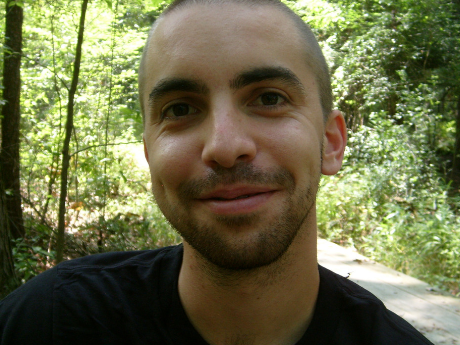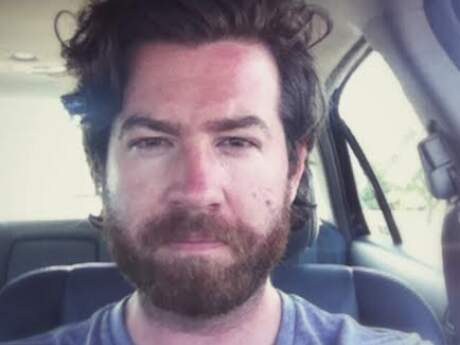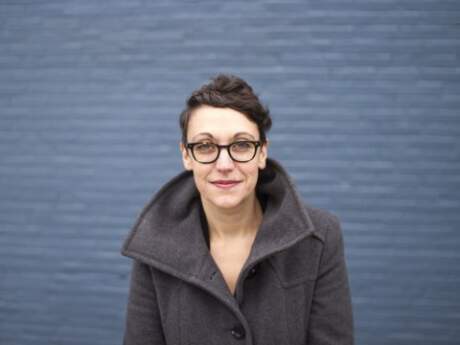New American Poets
New American Poets: Zach Savich

Serenade
In the painting by Degas, the dancer is not
on a cell phone, but holding her head. I left the museum.
Ann was sick. There were shoes all along the bridge,
and the senseless branching of ambulance sirens: one going west
on Henderson, another east. Technicolor weather. A man
in white coveralls was carrying a traffic cone
over his head, he was an Elmer's glue tube.
In the painting of terns on rigging,
when you remove the terns from the rigging, there is
only canvas behind, not sky. Ann vomited
off the bridge, the way a single page can slide
from its binding. It became harder for me to read on
in the biography, knowing there is no part of the body
a bullet hasn't pierced. Piercework. I worked in a chowder house
and got to bring home all the innards we extracted
from bread bowls. I had a friend who was a trumpet player
who'd come home from a show and, sleepless, play more.
His apartment was so small, his trumpet
stuck into the alley. Ann slept for two or three months.
Snow like tissue after tissue pulled from a box.
I drove Ann to the hospital. On the first day of spring I saw
the Elmer's man standing on the traffic cone point
of his head at a rave. Trees blossomed outside the hospital
the way champagne bottles christen ships. I wheeled Ann
to the museum and we watched the Indian out front
raise his arms to weather. I talked about the Caravaggios
facing each other in Santa Maria del Popolo, the pose
of Paul, receiving, so close to the pose of Peter,
received; saints open their arms. Pieced through.
My friend the trumpet player emptied his spit valve onto pigeons.
He watched a woman climb onto her fire escape, nude,
her husband cursing from the window. I gave up on
the biography. I left the rave. Ann held her head.
The ambulances were just roaming, moving things around.
I put on some shoes I found on the bridge, then left the bridge.
Ann bruised. Her mom showed up. It was July.
From Full Catastrophe Living (University of Iowa Press, 2009). Reprinted with the permission of the author. All rights reserved.
A Happy Book, or: Orb Made of Many Pennies and Invisible Tape
My poetics is simple: I think we should employ the full capacity (or a limited capacity, fully) of both language and the world, like a walk with a smart friend does. There's a house that looks like driftwood, a dog hitched to a clothesline. Doggy runs, so some loose plastic pins slide along the cord, like beads down an abacus. I mishear my friend: "abacus" becomes "platypus." This is all very interesting, which is the whole of my process: I try to be very interested. I have feelings and write them down. I go for walks, drink coffee, talk to friends. My experience of the world/language is not trite or nonchalant or impenetrable or random so why should my poems be? I get stuck on this: if the full capacity is possible, how can we bear anything else? I guess capacity rhymes with catastrophe, so maybe my book should be called Full Capacity Living. Of course, Full Living Capacity would be better: poetics as the revelation of sensibility via the sensations we honestly know by such instincts/ears.
Poetics: Last night watching football while we wrote unpublishable poems in the style of Basho and Sora, reading to each other from the selected poems of Merrill Gilfillan and the journals of Lewis and Clark, a friend and I invented collective nouns (a Song of Solomon of Pork Tacos, a Tolerance of Stars), looking up when we heard the hits. The color commentator seemed to be having problems at home—"Why bother going for the field goal? They'll still need another touchdown." At one point, action on the field cut him off. All he said was, "You'd need a laser." Call me: Man Narrating Football Accidentally But Revealingly Speaks of Lasers or Homelife.
I read the proofs of my book at Dunkin Donuts. I was surprised by how happy the poems seemed. I had thought they held only panic, desperation, folly. I had no idea I had written a happy book.
A teacher said: you need to decide if you think the world is meaningful or not. And then, whether it is or not, if art can be. And if art can be, shouldn't it?
Poetry as cosmology, as echolocation, as what you want to read when you are sick of TV (I can only read Shakespeare when I am sick of TV). As faith in empiricism; because we experience language, even the best abstractions are empirical. Not can poetry matter but poetry is matter.
Because maybe we've been wrong about it all—how wonderful! I write now with apples outside, dusk. I want to say I am looking through the peel of a hollowed apple. I think of an orb made of pennies stuck together with invisible tape. I want to write books that will thrill you in a used book store in ten years.


